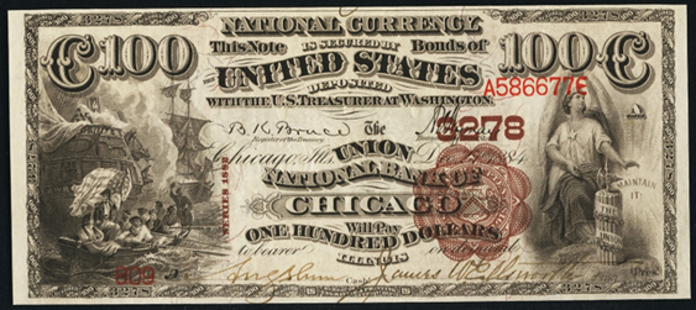One Hundred Dollar Notes › Nationals › 1882 One Hundred Dollar National Bank Notes › South Carolina Charters › 1882 $100 Anderson South Carolina National Bank Of Anderson
Get Value Now
| Item | Info |
|---|---|
| Series | 1882 |
| Charter | #2072 National Bank of Anderson of Anderson, South Carolina |
| Year Chartered | 1872, 61 Banks Chartered |
| City Info | Anderson is a city in and the county seat of Anderson County, South Carolina, United States. The population was 26,686 at the 2010 census, and the city was the center of an urbanized area of 75,702. It is one of the principal cities in the Greenville-Mauldin-Anderson Metropolitan Statistical Area, contiguous with Anderson County, which had a population of 187,126 at the 2010 census. It is further included in the larger Greenville-Spartanburg-Anderson, South Carolina Combined Statistical Area, with a total population of 1,266,995, at the 2010 census. Anderson is just off Interstate 85 and is 120 miles from Atlanta and 140 miles from Charlotte. Source: Wikipedia |
| Similar Cities | If your note doesn't match try: 1. Anderson, Indiana - First National Bank 2. Anderson, Indiana - Madison County National Bank 3. Anderson, Indiana - National Exchange Bank |
| Seal Varieties | Brown, Blue |
| See Also | If your note doesn't match try: 1. 1882 $100 Gold Certificate 2. 1878 $100 Legal Tender 3. 1880 $100 Legal Tender |
| Other Info | 1. Value depends on notes known for charter, condition and market demand. 2. Rare and highly desirable National Note. |
| Neat Fact | Plate letters A-C for $50 Notes, A for $100 Notes (Friedbergs, 20th Ed. P 99) |
No Obligations Offers and Appraisals
Please submit a good photo or scan. It will be identified and evaluated. Understand there may be subtle differences between the image you see above and your note. Signatures, design, markings and note condition will determine the offer price. Notes in Uncirculated or better condition receive the best offers.
Appraisals can be estimated for wholesale and retail prices. Wholesale is what dealers typically pay. Retail is what a collector might pay. Retail is slightly higher in most cases.
Please visit this page for USA Paper Money Reference. Do not treat this page as a reference guide, it is for appraisal and acquisition purposes only.
